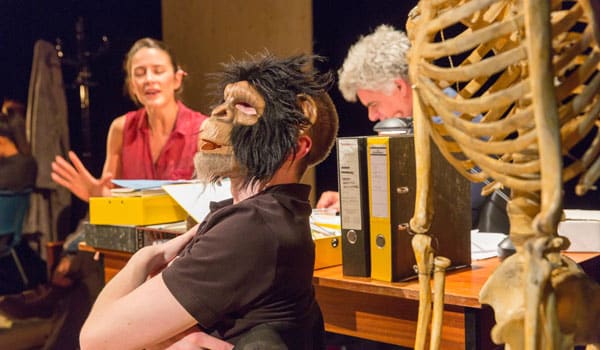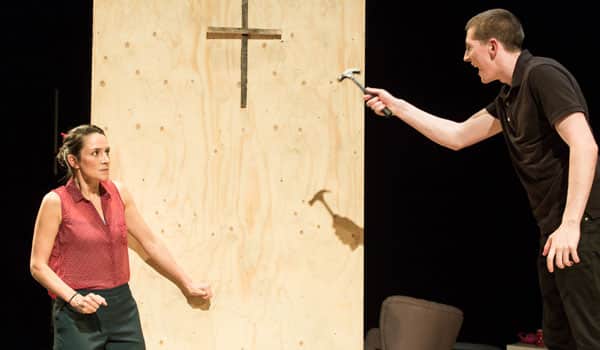
Martyr
18/09/15
Unicorn Theatre
3 Stars
Martyr was first performed in Berlin in 2012, and since then has travelled to France and most recently to Chicago, where it was performed earlier this year in a translation by Maja Zade, also used here at the Unicorn. Playwright Marius von Mayenburg has been a resident dramaturg and director at the famous Schaubühnefor well over a decade now where he has produced ten of his own plays and several notable adaptations. This latest work, like most of its predecessors, attempts to confront and explore the scope of mutual human brutality but within the framework of a theme which could not be more topical – what limits are there to toleration? How far should one accommodate intolerance in a pluralist society? How do you handle individuals determined to embrace martyrdom irrespective of the consequences to themselves and to others?
The play is set in a contemporary school where Benjamin Sinclair (Daniel O’Keefe) in the midst of adolescence decides to plant the flag of rebellion in the field of religious belief. He has taken up reading the Bible from his own fundamentalist perspective, and as the play starts he is refusing to attend communal swimming lessons because of the skimpy clothing worn by the girls. He goes on to take exception to his mother’s single divorced status, and proceeds to find fault most of his teachers and teaching, demanding that they take his views into account not as alternative equal values but as preferable choices to standard orthodoxies.
His protests take the form of more than simply withdrawal from participation. In a sex education lesson he takes off his clothes in order to defy his teacher and provoke her to the moral disapproval and application of boundaries she will not provide within the lesson itself. In an essay on the Industrial Revolution he inserts an irrelevant rant of his own. He mocks the well-meaning School Chaplain as an institutional bureaucrat rather than a person of real authentic faith. As the play develops, the action and debate focus increasingly on his conflict with one teacher Erica White (Natalie Radmall-Quirke), who becomes obsessed in turn with beating Benjamin at his own game. She is the representative and advocate for rationalism and scientific understanding of the world, who teaches evolution, and claims to offer guidance to disturbed students. In German the title of the play is plural rather than singular, and the final issue raised in the drama is the question of who is the actual martyr. Is it Benjamin or is it Erica? Or both? Is there ultimately some kind of moral equivalence between them?
The onus of the play rests as much therefore on the forces of authority and how they choose to react as on the challenger. His mother Ingrid (Flaminia Cinque) tries to blame the school authorities for mishandling the matter from start to finish – and here she has a good point though not for the reasons the play suggests. The headmaster, a craven bureaucrat, tries to split the difference between rebel and teachers, in a way that only serves to exacerbate the situation, and the teachers themselves react either with bluster or inappropriate emotional engagement rather than argument. The playwright makes a particularly good point of showing how ill-equipped a morally relative, modern pluralist position of toleration is in facing up to intolerance. If you have abolished boundaries yourself, or no longer know where to place them, how can you argue with those who do not recognise those terms of argument but have very clear and immovable boundaries of their own? Moreover, the fundamentalist is ideally placed to play bait-and-switch with politically correct notions of tolerance as Benjamin does to devastating effect at the end of the evening.

But beyond this point the drama begins to lose a degree of credibility. It is not enough to demonstrate this problem and leave the forces of official tolerance and conventional authority little further recourse. In any educational setting in my experience there would be plenty of further real-life steps to take, whether ignoring and failing to rise to Benjamin’s provocations, or using humour and satire against him in the tradition of Enlightenment anti-clericalism. This is a play where the actors find humour in the situations played out, but where there is precious little light and shade, satire or wit in the text itself. These aspects are not explored.
Moreover there are simply better arguments for toleration and diversity that can be made here, not least through evocation of the very Christian roots of toleration in European history that are at least as important as the history of Christian persecution. It is simply self-defeating to have the opposition represented by figures that enter battle with broken weapons and an unfocused anger or moral relativism. This may be a fair comment on much of the actual response to fundamentalism on the part of present-day governments and educators, but as a dramatic exploration of the theme this is unnecessarily impoverished. If ever there was another reason to revive the plays of Bernard Shaw and the spirit of St Joan within them we have it here.
The writer is more successful in exploring Benjamin’s relationships with his fellow pupils, and indeed we could and should have had more of this. One of the most effective dialogues within the play is with his friend George (Farshid Rokey), who is physically impaired. There is an excellent scene in which Benjamin plays on George’s multiple vulnerabilities to recruit him to his fundamentalist cause – this expresses subtly how recruitment often operates, and does it by showing us in the drama not telling us in didactic speech. Likewise there is a real dramatic tension whenever Benjamin encounters the feisty Lydia Webber (Jessye Romeo) who perceives his sexual insecurity and anxiety and plays upon it shrewdly and successfully, taking control of situations in a way lost on their ham-fisted teachers.
There is one other general point that needs to be made. Even a few years ago before the issue of recruitment to ISIL/ISIS became so prominent it was clear that the main forum in which this particular debate confronts us today is in relations between certain types of Islamic fundamentalism and the West. This play would not have been written without that confrontation in mind: contemporary Christianity is too fractured and fragmented by secularization to offer this kind of example readily except perhaps in certain part of the USA. While the playwright deserves credit for raising these issues at all, the way he does it is still ultimately something of a displacement activity. Since the days of the Ancient Greeks it has been a central part of the role of theatre to address and explore the shared anxieties of the community. Until that is done head-on, with all the difficulties attendant on it, then theatre will not have risen to the real and beckoning challenge.
There are several very fine performances across the cast and none that disappoint. O’Keefe plays his part with an alarming, brittle intensity and interrogates his opponents with forensic skill and layered contempt. As his main opponent Radmall-Quirke delineates a clear path of disintegration of her own, enabled by particularly weasel-worded evasions from headmaster Mark Lockyer. Kriss Dosanjh makes the best of the Anglican case for inclusion as the put-upon Chaplain, and both of the highlighted school friends take full advantage of their opportunities. Flaminia Cinque lightens the tone of the play wherever possible with stock mother-and-son comic moments, and Brian Lonsdale completes the cast as Erica’s partner and the history and PE teacher who stands up best to Benjamin – a role that seems rather underwritten.
The Unicorn stage offers a very large, cavernous tableau for these intense conversations, but Ramin Gray’s direction and set design keep things moving well and use the familiar daily apparatus and detritus of school life to very good and inventive effect – we move seamlessly from classroom to office, to playground, to river bank, and to domestic interiors without any need for scene changes.
This is an unsettling rather than disturbing night at the theatre that raises more questions than it can readily answer, and part of trouble lies in the way those questions are posed. However, this is terrain where few convincing pathways are currently discernible and where few playwrights have dared to tread at all. The subject and theme still awaits its Voltaire, its Shaw or even perhaps its David Hare.
